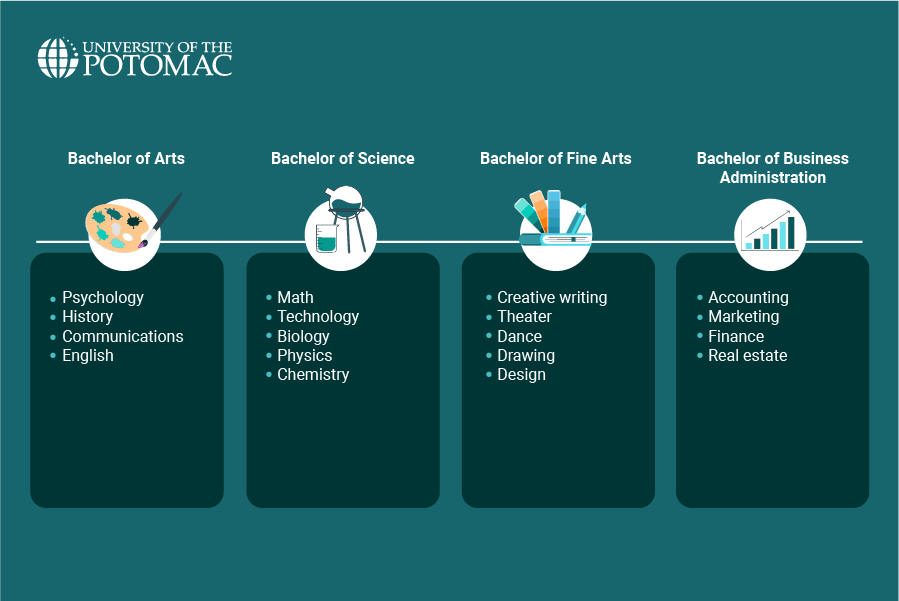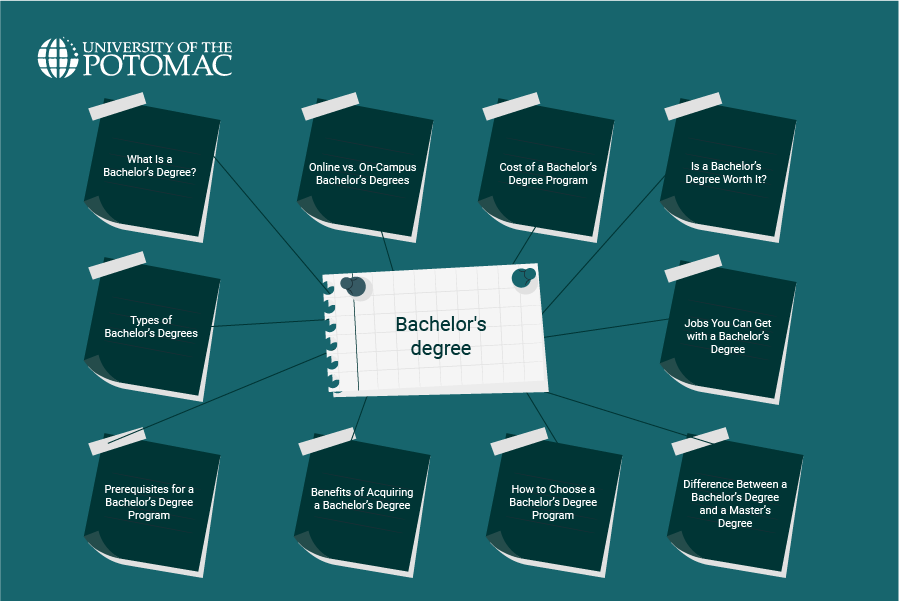A bachelor’s degree is the first milestone in the journey towards your dream career. Continue reading and learn everything you need to know about earning a bachelor’s degree.
A bachelor’s degree is the first university experience for most people, and it involves a four-year program that deepens your skills, expands your knowledge, and prepares you for various career paths. But there’s more to a bachelor’s degree than that.
So, do you want to learn more about what a bachelor’s degree is and why you should get one?
Today, you’re in luck! In this blog, we’ll explore everything you need to know about bachelor’s degrees, such as their types, admission requirements, cost, benefits, and more. So join us and learn the ins and outs of this degree.
What Is a Bachelor’s Degree?
A bachelor’s degree is a credential awarded by colleges and universities upon completing coursework over four years or a minimum of 120 college credits. It provides foundational knowledge and skills in a particular field of study and often serves as a prerequisite for many careers and advanced degrees.
Bachelor’s degree programs typically provide general education coursework focusing on a specific major or field of study. They are available in an extensive range of fields, such as psychology, computer science, business, nursing, etc.
Types of Bachelor’s Degrees

As you explore bachelor’s degree programs, you may come across various types, which can be confusing. The most common types of bachelor’s degrees include:
- Bachelor of Arts (BA): A BA allows you to major in humanities or social sciences, such as psychology, history, English, or communications. This degree is broad enough to pursue careers in human resources, teaching, advertising, or government work.
- Bachelor of Science (BS): You earn a BS after studying math, technology, or natural sciences, such as biology, physics, or chemistry. These degrees emphasize quantitative and research skills, often leading to a career in STEM.
- Bachelor of Fine Arts (BFA): A BFA allows you to major in fine, performing, or visual arts, such as creative writing, design, drawing, theater, or dance. A BFA is a good option if you want to pursue a career as a museum curator, illustrator, music director, or web designer.
- Bachelor of Business Administration (BBA): A BBA is a degree that helps you establish a foundational understanding of business and how it applies to the real world. It prepares you for a career in accounting, marketing, finance, or real estate.
Prerequisites for a Bachelor’s Degree Program
As you explore different types of bachelor’s degrees, you should also examine the admission requirements when applying to a program. In general, the requirements include:
- A high school diploma or equivalent GED
- Standardized test scores like the SAT or ACT
- Past grades or GPA
- Letters of recommendation
- Personal essays
Are you worried if you can’t meet all the requirements? A positive shift in the admissions process is that more schools are dropping requirements like standardized test scores, as this metric isn’t all that helpful in determining whether or not a student is a good fit for the school.
Online vs. On-Campus Bachelor’s Degrees
The main differences between online and on-campus degrees include:
- Flexibility: Online degrees are more flexible regarding schedule and location, whereas on-campus degrees require you to attend classes in person and adhere to a fixed schedule.
- Cost: Online degrees often offer cost advantages over on-campus degrees. This way, you can save on housing, commuting, and other on-campus expenses.
- Learning experience: Online classes utilize video conferencing and digital learning platforms. On the other hand, on-campus degrees allow you to interact with your teachers and peers face-to-face.
However, who’s to say you can’t have the best of both worlds? The hybrid model is becoming increasingly popular, which allows for face-to-face interaction and virtual learning experiences. This way, you can benefit from the structure of a traditional classroom while also experiencing the flexibility and convenience of online degrees.
Cost of a Bachelor’s Degree Program
According to the Education Data Initiative, the average cost of a bachelor’s degree is $38,270 per year, including supplies, books, and living expenses. Tuition and fees make up the bulk of the costs, on average $17,709.
However, the total cost of undergraduate education depends on several such as:
- Public vs. private college or university
- In-state vs. out-of-state institution
- In-person vs. online programs
- Program of study
Saving up to pay for college can take time, so you should explore other ways to finance your studies. Some options include financial aid, grants and scholarships, employer tuition assistance, or work during school.
Benefits of Acquiring a Bachelor’s Degree
A bachelor’s degree requires a significant investment of time and money. So, on the brighter side, let’s look at the benefits of a bachelor’s degree.
First and foremost, earning a bachelor’s degree can increase your earning potential. According to data from the National Center for Education Statistics (NCES), bachelor’s degree holders, on average, earn 62.8% more than non-degree holders.
Earning a bachelor’s degree also opens doors to more job opportunities. Furthermore, for many fields, a bachelor’s degree is the minimum educational requirement for entry. Even if the field doesn’t formally require a degree, employers may still prefer to hire people who hold one. Data collected by BLS shows that workers with a high school diploma have an unemployment rate of 3.9%, whereas workers with a bachelor’s degree have a lower unemployment rate of 2.2%.
But earning a bachelor’s degree isn’t just about getting a job and a higher salary. It allows you to experience personal and professional growth. You also get to develop skills like teamwork, organization, time management, etc.
Lastly, a bachelor’s degree is a stepping stone toward a future in academia. Earning an undergraduate degree prepares you for the academic demands of graduate education.
How to Choose a Bachelor’s Degree Program

As the bachelor’s degree program can significantly impact the classes you take and what you do in the future, choosing a suitable program is vital for building a secure future.
But how do you choose the right bachelor’s degree for you?
Interested in pursuing a degree?
Fill out the form and get all admission information you need regarding your chosen program.
This will only take a moment.
Message Received!
Thank you for reaching out to us. We will review your message and get right back to you within 24 hours.
If there is an urgent matter and you need to speak to someone immediately you can call at the following phone number:
- We value your privacy.
To choose a bachelor’s degree program, make sure to consider factors such as:
- Career goals: Reflect on what you want to achieve in your career and consider your interests, strengths, and the work environment in which you thrive.
- University reputation: Make sure that the school you choose is accredited and is known for providing quality education.
- Program flexibility: Check to see if the program offers flexible learning options, which will allow you to balance school with other important parts of your life.
Is a Bachelor’s Degree Worth It?
While we’ve mentioned the benefits of earning a bachelor’s degree, let’s discuss what makes it worthwhile in the long run.
Earning a bachelor’s degree is one of the most powerful ways to transform your work, develop new skills, and improve your job stability and satisfaction. It also allows you to compete for rewarding positions and be more adaptable to evolving industry demands, setting a solid foundation for a fulfilling and successful career. Furthermore, while the cost is a valid concern, the investment made in your degree often yields substantial returns in the future.
Jobs You Can Get with a Bachelor’s Degree
As mentioned above, earning a bachelor’s degree will give you a credential to help you find employment in various fields. But what jobs can you get with a bachelor’s degree? Some of them include:
- Business: Sales manager, management analyst, accountant, and marketing manager
- Healthcare: Registered nurse, medical and health services manager, clinical trial administrator, pharmaceutical sales representative, and hospital administrator
- Technology: Computer and information systems manager, database administrator, software engineer, and operations analyst
- Education: Preschool teacher, curriculum developer, administrator, and school librarian
Difference Between a Bachelor’s Degree and a Master’s Degree
The most significant differences between a bachelor’s and a master’s degree lie in the academic level and the depth of study. A bachelor’s degree is an undergraduate degree and provides broad foundational knowledge in a field of study. In contrast, a master’s degree is a graduate degree that provides specialized knowledge in a field of study.
Because graduate degrees are advanced degrees, you must first get a bachelor’s degree to earn one. Furthermore, a graduate degree usually leads to more advanced or managerial roles.
Lastly, bachelor’s and master’s degrees differ regarding time commitment. A bachelor’s degree typically takes four years to complete, whereas a master’s degree takes one to three years.
Conclusion
A bachelor’s degree is the cornerstone of higher education, providing foundational knowledge and skills in a particular area of study.
Whether you’re a student or professional of any age or background, earning a bachelor’s degree can get you closer to your goals. It leads to a higher earning potential, opens doors to more job opportunities, and provides the perfect avenue for personal and professional growth.
Are you ready to start exploring? Take a look at our bachelor’s degree programs and start your journey today!
Frequently Asked Questions (FAQs):
Is it hard to earn a bachelor’s degree?
Earning a bachelor’s degree can be challenging, as it’s an endeavor that requires commitment and effort. However, among the benefits of a bachelor’s degree are job security, higher earning potential, higher job satisfaction, and networking opportunities, which make it a worthwhile investment.
How long does it take to earn a bachelor’s degree?
In general, a bachelor’s degree takes four years to complete. However, this timeframe can change for accelerated programs, which take three years, and part-time enrollment, which can take up to six years.
Are bachelor’s and baccalaureate degrees the same thing?
Yes, bachelor’s and baccalaureate degrees are the same thing and refer to the four-year undergraduate degree awarded by colleges and universities.










